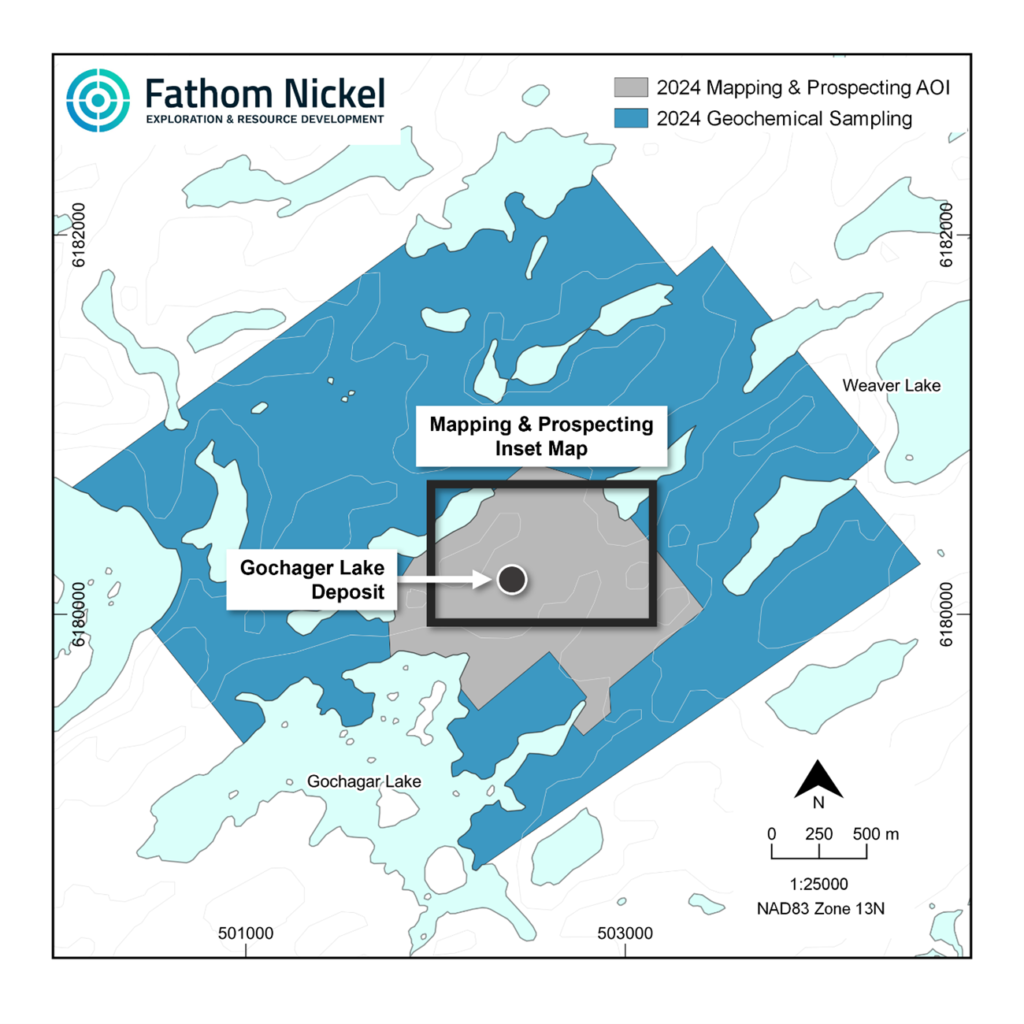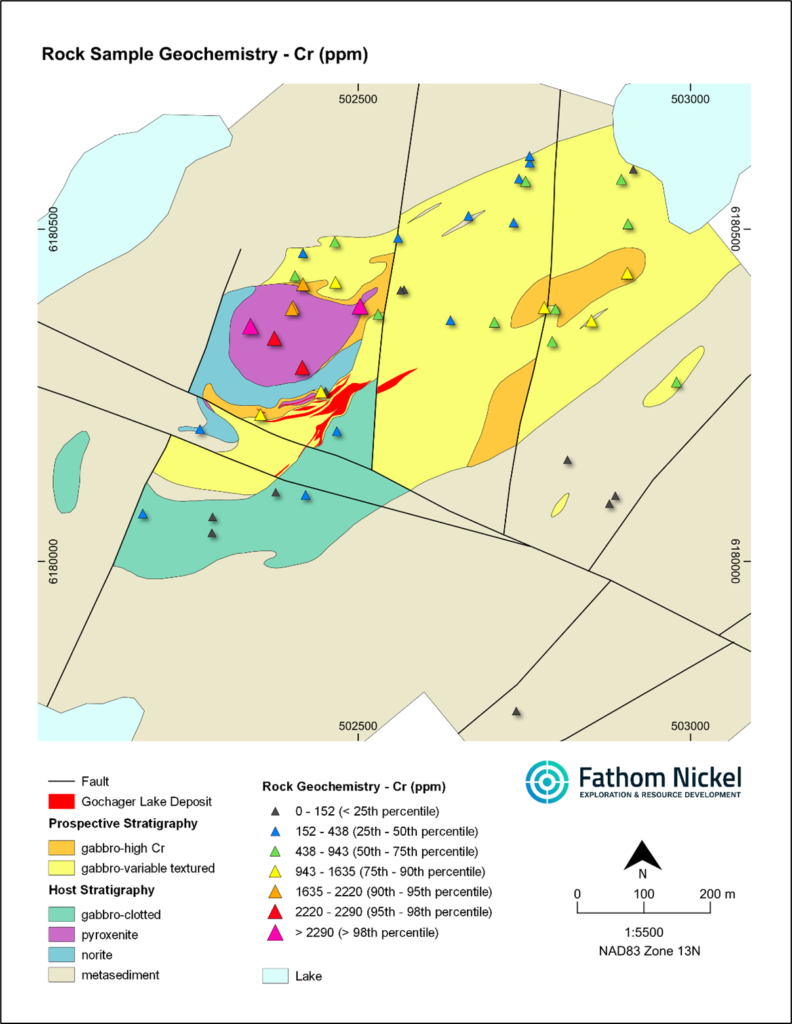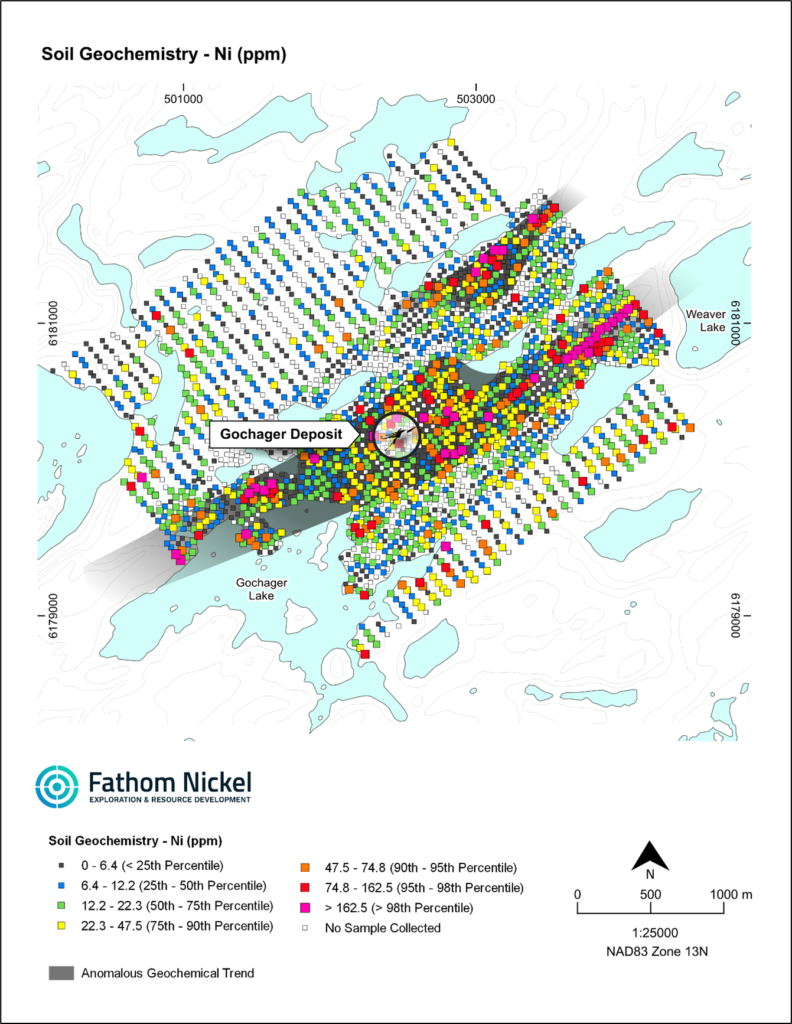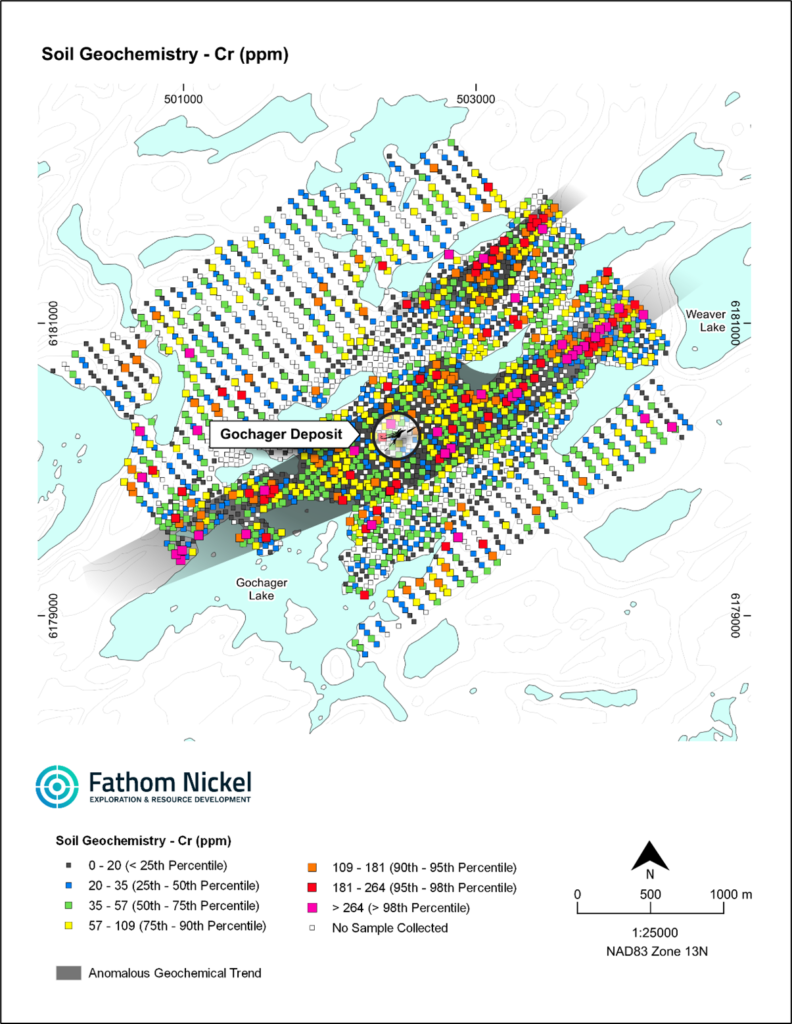
FATHOM EXTENDS GEOCHEMICAL FOOTPRINT OF THE HISTORIC GOCHAGER LAKE DEPOSIT AREA BY UP TO 25 TIMES
NOT FOR DISTRIBUTION TO UNITED STATES NEWSWIRE SERVICES OR FOR DISSEMINATION IN THE UNITED STATES. ANY FAILURE TO COMPLY WITH THIS RESTRICTION MAY CONSTITUTE A VIOLATION OF U.S. SECURITIES LAWS
Calgary, Alberta – August 26, 2024 – Fathom Nickel Inc. (the “Company” or “Fathom”) (CSE:FNI) (FSE: 6Q5), (OTCQB: FNICF) is pleased to provide final results from the extremely successful June soil and rock geochemistry program completed at the Company’s 22,000+ ha Gochager Lake Property (see Press Release July 18, 2024). In overview, the results clearly demonstrate that the geochemical footprint of the Gochager Lake deposit has been extended by up to four kilometers along trend (approximately two kilometers in both the NE and SW directions).
Please join Ian Fraser, CEO in a webinar discussion today (August 26) at 8:30AM MDT for an in-depth discussion of the Gochager Lake geochemistry results. Webinar link:
https://us06web.zoom.us/j/84403466191
Highlights of the June results include:
- Results from the pXRF analyses of outcrop chip samples and outcrop rock sampling has expanded the variable-textured gabbro footprint in the historic Gochager Lake deposit area, approximately 12.5 times (Figure 2)[1].
- Soil geochemistry results define a Ni-Cu-Co+Cr-Mg in-soil geochemical signal, analogous to the historic Gochager Lake deposit geochemical footprint, over an area of approximately 1.7km2; an area representative of 25 times the area of the historic deposit geochemical footprint.
- We identified a very prominent linear trend of coincident and highly anomalous Ni-Cu-Co+Cr-Mg in-soils exceeding 600 meters in length and up to 100 meters in width, indicative of a subsurface mafic – ultramafic source rock. This identified trend occurs approximately 1.2km east-northeast of the historic Gochager Lake deposit and extends northeast towards Weaver Lake and remains open beyond the end of the zone of soil sampling (see Figures 3 and 4)
- One individual soil sample returned a very impressive 1,650ppm Ni, 116.5ppm Cu and 373ppm Co from a multi-station, multi-element, soil anomaly occurring approximately 1.0km west-southwest of the deposit area.
Ian Fraser, CEO and VP Exploration stated, “The Company is ecstatic with the results from this soil and rock geochemistry program. Through our drilling at the historic Gochager Lake deposit over the course of the last 18 months, we have developed a clear understanding of the deposit’s geochemical footprint. The combination of highly anomalous Ni-Cu-Co + chrome (Cr) and magnesium (Mg) in-soil, rock geochemistry results generated by pXRF, and rock assay data has expanded the Gochager Lake deposit geochemical footprint dramatically – to an area that now measures, incredibly, some 1.7 square kilometers. That’s 25 times larger than the area of the historic Gochager Lake deposit. In addition, we have identified other, separate, very prominent Ni-Cu-Co + Cr-Mg in-soil anomalies outside of this 1.7 square kilometer footprint area. Underlaying this geochemical footprint is a very distinct MAG feature recognized through the ongoing interpretation of the 2008 VTEM survey. We are very confident that our exacting exploration approach will continue to successfully expand the historic Gochager Lake deposit along strike and to depth – in terms of both grade and tonnage. We are also very confident of significant additional discoveries both within the now-expanded footprint, and also the greater Gochager Lake property. Based on continuing results, there is clear and compelling potential for a major discovery to be had here.”
Figure 1 – Area covered by Geological Mapping and Soil Geochemistry

Figure 2 – Cr Rock Sample Geochemistry Map
- The variable-texture gabbro has unusually high Cr (chrome) values as compared to a typical gabbro.
- Cr is a unique pathfinder element associated with the variable-textured gabbro that Fathom now recognizes as the container rock, host to the disseminated to semi-massive to massive sulphide breccia mineralization defining the historic Gochager Lake deposit.
- The high Cr rock geochemistry has significantly expanded the favourable variable-textured gabbro in the deposit area (~12.5 times).

Figure 3 – Ni-in-soil Geochemistry Map
- Two very prominent northeast – southwest trends have been defined by Ni-in-soil results.
- The MAG feature mentioned conforms to the most prominent trend.
- Cu and Co values consistently mirror and correspond with the Ni in-soil values.

Figure 4 – Cr-in-soil Geochemistry Map
- The high Cr-in soil is an indication of variable-texture gabbro occurring in the subsurface, or the presence of ultramafic rock occurring in the subsurface; specifically in the very linear feature northeast of the Gochager Lake deposit.
- The high abundance of Ni-Cu-Co in-soil associated with Cr-in-soil suggests mafic (variable-textured gabbro) to ultramafic rock occurring in the subsurface is potentially mineralized.
- The Cr-in-soil conforms to areas mapped as variable-textured gabbro and high-Cr gabbro (Figure 2).

In addition, the Company is also pleased to announce that the construction of the 20–25-person, all-season camp at the Gochager Lake project has been completed. The Company was able to take advantage of the mobilizing of camp gear to the project to also include the mobilization of the TUZO GeoSurveys Drone MAG equipment and personnel. The Drone MAG survey was completed August 6th – 11th. Results of the 367.2 line-kilometer survey are expected during the first week of September.
Quality Assurance / Quality Control (QA/QC) Disclosure Statement
The Company contracted the services of TerraLogic Exploration Inc. (“TerraLogic”) to conduct its soil and rock geochemistry program within the historic Gochager Lake deposit area. Soil samples were collected using either a hand auger or a geotool at pre-determined sites utilizing a 100m x 50m sample spacing configuration and a detailed 50m x 50m sample spacing configuration. The B-horizon soil was collected at each site, placed in kraft soil sample bags and all metadata associated with each sample location was recorded. Once sorted and logged, samples were shipped to ALS Canada Ltd. (“ALS”) in North Vancouver, British Columbia. At ALS, individual samples were dried and sieved to -180 micron (80 mesh) and both fractions were retained. A 0.5g split of the sieved portion was partially digested (Aqua Regia) and analysis of 54 elements was performed by ultra trace ICP-MS (ME-MS41). Rock samples were crushed and pulverized up to 250g, 85% <75um. A 0.4g split was dissolved by 4-acid digestion and analysis of 33 elements was performed by ICP-AES (ME-ICP61). Ore grade measurements were performed by ME-OG62 and Ni-OG62. Platinum, palladium and gold by PGM-ICP27 and total sulphur by S-IR08. ALS is an ISO / IEC 17025 certified laboratory and independent of Fathom.
During the soil geochemistry program, TerraLogic crews were instructed to collect one duplicate sample per person per day. In all 63 duplicate samples were collected representing samples collected from either the same sample pit or a new adjacent sample pit. Internal QAQC was performed on all duplicate samples to umpire for contamination occurring between samples. The Company’s QAQC approach to the rock samples collected compares to the Company’s drill core approach. One Standard and one Blank standard was included into the batch of 51 rock samples.
As part of its ongoing exploration activities, Fathom is utilizing a portable Vanta™ XRF Analyzer (“pXRF”) to provide real-time lithogeochemical multi-element data on drill cores from current drillholes and recently on surface outcrop samples at the Gochager Lake project. The Vanta™ XRF Analyzer is a hand-held device, held in position for a total 120 seconds – beam 1 (30 seconds), beam 2 (60 seconds) and beam 3 (30 seconds) to allow for an effective reading of elements occurring at that specific point, and at that specific surface of a rock sample. All elements detected at that specific point; nickel, copper and cobalt plus key pathfinder elements, chrome and magnesium, are recorded. The reader is cautioned that pXRF data should be treated only as an indication of elements, as the accuracy of the beam position on a particular element is variable.
As with drill core sampling a rigid QA/QC process is in place for the collection and analysing of pXRF data. Internal QA/QC protocols were also implemented to ensure that real-time pXRF geochemical data collected on site was of high quality and reliable. Spot scans of SiO2 blank and certified reference material were conducted every 25 scans, alternating the blank and standards every 50th scan. pXRF data collected on QA/QC material was periodically plotted in graphical form to check for data entry errors and instrument drift.
Qualified Person and Data Verification
Ian Fraser, P.Geo., CEO, VP Exploration and a Director of the Company and the “qualified person” as such term is defined by National Instrument 43-101, has verified the data disclosed in this news release, and has otherwise reviewed and approved the technical information in this news release on behalf of the Company.
About Fathom Nickel Inc.
Fathom is an exploration company that is targeting magmatic nickel sulphide discoveries to support the rapidly growing global electric vehicle market and to secure the supply of North American Critical Minerals.
The Company now has a portfolio of three high-quality exploration projects located in the prolific Trans Hudson Corridor in Saskatchewan: 1) the Albert Lake Project, a 90,000+ hectare project that was host to the historic and past producing Rottenstone Mine2 (produced 28,724 tons @3.3% Ni, 1.8% Cu, 9.63 g/t 3E (Pd-Pt+Au) 1965-1969), and 2) the 22,000+ hectare Gochager Lake Project that is host to a historic, NI43-101 non-compliant open pit resource consisting of 4.3M tons at 0.295% Ni and 0.081% Cu3, and 3) the 10,000+ hectare Friesen Lake Project located 40km southwest of the historic Rottenstone Mine and 30km northwest of the historic Gochager Lake deposit.
2 – The Saskatchewan Mineral Deposit Index (SMDI #0958) reports the production grades noted above from a small open pit. Fathom cannot confirm the production numbers nor a historic resource estimate that may have been in place ahead of production. The historic pit exists, and the Company trusts the production, as noted in SMDI #0958, to be accurate. The Company has performed test assaying of Rottenstone-type mineralization and results are consistent with production grades.
3 – The Saskatchewan Mineral Deposit Index (SMDI #0880) reports drill indicated reserves at the historic Gochager Lake Deposit of 4,262,400 tons grading 0.295% Ni and 0.081% Cu mineable by open pit. Fathom cannot confirm the resource estimate, nor the parameters and methods used to prepare the reserve estimate. The estimate is not considered NI43-101 compliant and further work is required to verify this historical drill indicated reserve.
ON BEHALF OF THE BOARD
Ian Fraser, CEO & Vice President Exploration
1-403-650-9760
Email: [email protected]
or
Matthew Mickleborough, Investor Relations
1-306-531-3644
Email: [email protected]
Forward Looking Statements:
This news release contains “forward-looking statements” that are based on expectations, estimates, projections and interpretations as at the date of this news release. Forward-looking statements are frequently characterized by words such as “plan”, “expect”, “project”, “seek”, “intend”, “believe”, “anticipate”, “estimate”, “suggest”, “indicate” and other similar words or statements that certain events or conditions “may” or “will” occur, and include, without limitation, statements regarding payment of terms under the Option Agreement, permitting for the Property, receipt of an exploration permit, timing of the exploration program on the Property and the Company achieving the earn-in thresholds under the Option Agreement. Forward-looking statements relate to information that is based on assumptions of management, forecasts of future results, and estimates of amounts not yet determinable. Any statements that express predictions, expectations, beliefs, plans, projections, objectives, assumptions or future events or performance are not statements of historical fact and may be “forward-looking statements.” Forward-looking statements are subject to a variety of risks and uncertainties which could cause actual events or results to differ from those reflected in the forward-looking statements, including, without limitation: risks related to failure to obtain adequate financing on a timely basis and on acceptable terms; risks related to the outcome of legal proceedings; political and regulatory risks associated with mining and exploration; risks related to the maintenance of stock exchange listings; risks related to environmental regulation and liability; the potential for delays in exploration or development activities or the completion of feasibility studies; the uncertainty of profitability; risks and uncertainties relating to the interpretation of drill results, the geology, grade and continuity of mineral deposits; risks related to the inherent uncertainty of production and cost estimates and the potential for unexpected costs and expenses; results of prefeasibility and feasibility studies, and the possibility that future exploration, development or mining results will not be consistent with the Company’s expectations; risks related to commodity price fluctuations; and other risks and uncertainties related to the Company’s prospects, properties and business detailed elsewhere in the Company’s disclosure record. Such forward looking statements involve known and unknown risks, uncertainties and other factors which may cause the actual results, performance or achievements of the Company to be materially different from any future results, performance or achievements expressed or implied by such forward-looking statements. These forward-looking statements are made as of the date hereof and the Company does not assume any obligation to update or revise them to reflect new events or circumstances except in accordance with applicable securities laws. Actual events or results could differ materially from the Company’s expectations or projections.
Fathom Nickel has significantly expanded the geochemical footprint of the historic Gochager Lake deposit area by up to 25 times.

